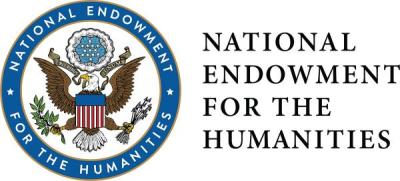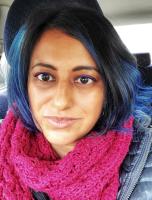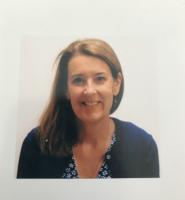Centering Humans in Humanities Programming
Join us for a live conversation about the importance and exciting possibilities of humanities programming.
In this webinar, three librarians will share their expertise on programming for adults to engage community members with subjects that tackle what is means to be human. You will also learn about an anti-oppressive framework for facilitation that encourages us to see the humanity of community as we create virtual programming during the pandemic.
Learning Objectives
- Gain perspectives for how to facilitate virtual humanities programs at your library for adult community members
- Gain ideas for humanities programs and engagement
- Learn about an anti-oppressive framework for facilitation

Funding for this webinar has been provided by the National Endowment for the Humanities (NEH) as part of Coronavirus Aid, Relief and Economic Security (CARES) Act economic stabilization plan.

Caitlin Goodman, Curator, Rare Book Department, Free Library of Philadelphia. Goodman has worked in the Special Collections Division of the Free Library of Philadelphia since 2013. She manages the collection-level priorities of the Rare Book Department, and is especially invested in expanding access to collections through a combination of good descriptive practices and community-centered public programs.

Mimosa Shah, Adult Program Coordinator at Skokie (Ill.) Public Library. For the past six years, Shah has developed informal learning opportunities alongside and for adults in the Skokie community. Currently, she is pursuing a master's degree in library and information sciences through the University of Illinois’s School of Information. Mimosa is deeply involved with MCN (Museum Computer Network), a learning organization dedicated to digital transformation of museums and the GLAM sector more widely.
This year, she and her fellow conference program co-chairs are planning a virtual conference around the theme of sustainability, and in particular, what practices can be used to preserve or progress the field in the face of uncertainty. Her work alternates between the analog and digital, with interests in media literacy and ways to deal with mis-(and dis-) information campaigns; digital photography and how we use various platforms to share, archive, and work against the constraints they sustain; zine-making and paper arts that memorialize stories that deserve to be documented; and space-making for and with communities marginalized by aspects of their identities.
In her spare time, she enjoys cooking, photography, hikes with her family, and dreaming about traveling (post-pandemic).

Margaret Woodruff, Library Director, Charlotte (Va.) Library. Woodruff has been the Library Director at the Charlotte Library in Charlotte, Vermont, for the past 9 years. Prior to that, she served as the library’s Youth Services Librarian. The small size of the library and community means that programming is a collaborative and interactive endeavor; and, Woodruff is thankful for her previous experience as a program coordinator at the Peabody Essex Museum in Salem, Massachusetts.
They have established the library as a hub in in their town for new ideas and activities, everything from permaculture workshops to foreign policy discussions. Alongside book groups and other traditional programs, their menu includes mental health support workshops, family science sessions and live music as well. Woodruff enjoys the opportunity to live and work in a small, rural community with support and encouragement from her neighbors. The Charlotte Library is excited to be a recipient of the ALA Resilient Communities climate-change related program stipend.

Moderator: B.B. Browne (they/she) is a program coordinator in ALA’s Public Program Office assisting projects like Resilient Communities: Libraries Respond to Climate Change, Community Connect: Digital Access at Home, and STARNet’s STEAM Equity Project. They are also an artist and producer in Chicago whose work focuses on community care and mutual aid.
